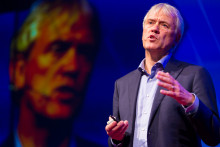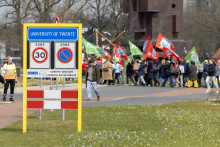Wennink’s keynote speech kicked off the afternoon programme of the Entrepeneurial Day. In his talk, the CEO focused on what aspiring entrepreneurs could learn from the story of ASML. ‘In the past decades, we grew from a small group of thirty people in the dungeons of Philips to currently 21.000 employees worldwide. How? Thanks to our ability to manage complexity.’
ASML
The Dutch company started in 1984 as a small venture of Philips and ASMI and grew to the world’s largest supplier of photolithography systems for the semiconductor industry. In the company’s own words, it ‘provides chipmakers with everything they need - hardware, software and services - to mass produce patterns on silicon, helping to increase the value and lower the cost of a chip’.
Fourth industrial revolution
‘The fourth industrial revolution is happening,’ continued Wennink. ‘And it is driven by resolution revolution, by our ability to store more data in the same space. This has been driven by what we call Moore’s Law, the observation that “the number of transistors in a dense integrated circuit doubles about every two years”. Nobody believed this would last this long: more than five decades. But it has and we will see further advances in processing power.’

In the midst of this revolution, ASML helps their customers to prepare for innovations – and the company can develop machines the customers need, machines that are (and will become more so) extremely complex. ‘How do we deal with this complexity?’ pointed out the CEO. ‘By integrating competencies. Innovation is all about integration. At ASML, we’ve gathered a global network of expertise. If someone does it better than us, we outsource. Integration of competencies inside and outside of the company is what drove us to the top.’
Don’t do everything by yourself
‘If you want to start a business, you need people that are better than you,’ repeated Wennink. ‘What stands behind our success? Poverty and neglect. We were a very poor company at first and therefore needed to find partners, find people who were better than us and who shared our dream. Neglect and no money is what makes a successful start-up.’
'Neglect and no money is what makes a successful start-up.’
The keynote speaker offered a few more tips on how to make it in the business world. Starting with trust between you and your stakeholders, to knowing your strengths and – once again – not doing everything yourself. ‘Diversity and different perspectives are key. Have people on your team that can do what you can’t do.’
Three pillars of leadership
Lastly, Wennink shared what he considered the three main pillars of leadership: clarity, lateral loyalty and authenticity. ‘You need be clear about people’s responsibilities and about the shared goals you are all trying to achieve. As a leader, I don’t necessarily care about the team members being loyal to me, but about them being loyal to each other. Nobody is bigger than the company, especially not the CEO. And finally, you need to be yourself, do what you feel is right. If you follow these three things, you will be successful.’







